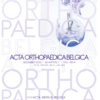How does kinesiophobia affect short- and long-term gait parameters in individuals with total knee arthroplasty surgery?
Total knee arthroplasty; kinesiophobia; spatiotemporal parameters; Win-Track; gait parameters; osteoarthritis
Published online: Feb 17 2023
Abstract
Delays in weight transfer due to various fears after Total knee arthroplasty (TKA) surgery negatively affect recovery. Therefore, the presence of kinesiophobia is essential for the success of the treatment. This study was planned to investigate the effects of kinesiophobia on Spatio-temporal parameters in patients who underwent unilateral TKA surgery.
This study was a prospective and cross-sectional study. Seventy patients with TKA were assessed preoperatively in the 1st week (Pre1W) and post- operatively in the 3rd month (Post3M) and 12th month (Post12M). Spatiotemporal parameters were assessed using the Win-Track platform (Medicapteurs Technology, France). The Tampa kinesiophobia scale and Lequesne index were evaluated in all individuals. A significant relationship was found between the Pre1W, Post3M, and Post12M periods and Lequesne Index scores (p<0.01), and this relationship was in favor of improvement. In the Post3M period, kinesiophobia increased compared to the Pre1W period, and kinesiophobia decreased effectively in the Post12M period (p<0.01). The effect of kine-siophobia was evident in the first postoperative period. In the correlation analyses between spatiotemporal para- meters and kinesiophobia, significant negative correlations were observed (p<0.01) in the early postoperative period (Post3M).
Evaluating the effectiveness of kinesiophobia on Spatio-temporal parameters at different time intervals before and after TKA surgery may be necessary for the treatment process.
